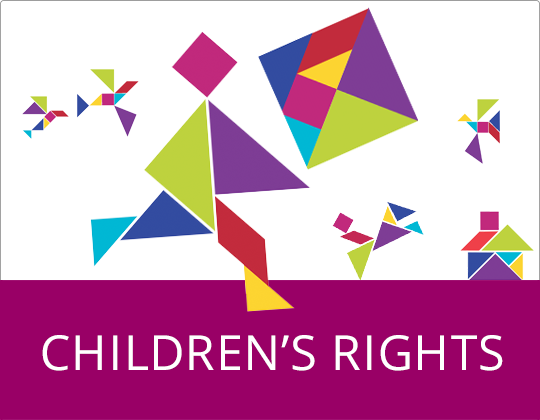Violence in schools

Violence in schools is one of the most visible forms of violence against children. Violence in schools can take many forms, ranging from physical violence to psychological violence. It is often expressed through acts of bullying, intimidation and repression. Violence in schools creates insecurity and fear which harm the general school climate and infringe pupils’ right to learn in a safe, unthreatening environment. Schools cannot fulfil their role as places of learning and socialisation if children are not in an environment free of violence.
Every child has the right to live free from physical and psychological violence. The United Nations Convention on the Rights of the Child requires states to take all appropriate measures to protect the child from violence.
The Council of Europe aims to eliminate violence in schools through educating children about human rights and democratic citizenship. Education plays an essential role in the prevention and eradication of violence in schools. The Council of Europe Charter on Education for Democratic Citizenship and Human Rights Education provides member states with a tool for action to combat all forms of discrimination and violence, especially bullying and harassment. The Charter has been adopted by all member states of the Council of Europe.
The Council of Europe also works in co-operation with the UN Special Representative of the Secretary-General on Violence against Children (SRSG) to prevent and address all forms of violence against children in schools. A high-level expert meeting on “Tackling violence in schools” was held jointly in 2011 and underlined the importance of encouraging all players involved to partner and co-operate to address violence in schools and ensure that schools provide safe environments in which all children have the opportunity to develop and learn. The outcomes of this European expert meeting also provided input for the global report of the SRSG, “Tackling violence in Schools – Bridging the gap between standards and practice”.
I. Democratic citizenship and human rights
Democratic citizenship refers to the democratic rights and responsibilities that come with membership of a political democracy. Democratic citizenship and human rights are connected and one cannot exist without the other. In order to eliminate violence, schools must create a human rights and citizenship culture in which all individuals understand their responsibility to treat one another with respect. This starts with school-wide education programmes.
The Council of Europe Charter on Education for Democratic Citizenship and Human Rights Education sets out objectives and principles which can guide member states in framing their policies and legislation to foster education programmes for democratic citizenship and human rights. It is the educational value of such programmes which can prevent violence and bullying in schools.
The Council of Europe offers many tools which can be used to increase awareness about democratic citizenship and human rights and educate children about their rights and responsibilities. The Directorate of Democratic Citizenship and Participation provides training for teachers and the necessary tools to make your school a Safe School with a human rights ethos. There is a wide range of material available for this purpose: training manuals, information booklets, guides, lesson plans, films and access to expert networks. These resources have been developed through collaborative projects and initiatives and build on existing good practices in Council of Europe member states.
Publications on the Charter of Education for Democratic Citizenship and Human Rights
II. Educational material on democracy and human rights
The Council of Europe has developed a number of educational tools aimed at helping professionals and children to build a safe learning environment:
The Violence Reduction in Schools Training Pack aims at supporting existing violence prevention schemes in member states and offers a school-wide approach to violence reduction and prevention. The training pack builds on previous Council of Europe analyses and data in existing publications and reports.
Compass, a manual on human rights education has been developed by a multidisciplinary and intercultural team of writers and educators to provide youth leaders, teachers and other educators, both professionals and volunteers, with concrete ideas and practical activities to engage, involve and motivate young people to form a positive awareness of human rights in their own way and in their own communities.
Compasito, a manual on human rights education for children was inspired by ‘Compass’ and has been developed for adult educators who work with children in secondary schools and in school environments. The core of the manual is educational activities designed for children which build on the concept of children as young citizens of the present and as rights-holders who are competent in many issues related to their lives. The activities in Compasito are organised around thirteen selected themes, e.g. discrimination, gender equality, media and Internet and participation.
The EDC/HRE Pack is a set of guidelines on various aspects of citizenship and human rights education which is based on examples of good practice in the member states of the Council of Europe. It addresses topics ranging from teacher training and democratic governance of schools to quality assurance and policy development and implementation. A series of “Living democracy” manuals have been developed for work in classrooms to help prevent violence against children and protect them from it through the promotion of a culture of human rights and democracy at school.
The Pestalozzi Programme is the Council of Europe’s training and capacity-building programme for education professionals. It aims at modelling how the Council of Europe’s values and standards can be translated into everyday practice in teaching and learning. As violence in schools is recognised as a global problem in all European countries, a training module on ‘Education for the prevention of violence in schools’ was developed in 2011-2012, targeting teachers, educators and teacher trainers. Another training module for educators was developed in 2013-2014 to address ‘Sex/sexuality education – personal development, prevention of discrimination and violence’ in the context of the Council of Europe’s ONE in FIVE Campaign to stop sexual violence against children. Teacher educators across Europe worked on the development and testing of teaching and training resources that promote holistic sexuality education based on the understanding that such education will help prevent discrimination and violence linked to sexuality.
The Charter of Education for Democratic Citizenship and Human Rights has a wealth of publications, including child-friendly materials, which can be found on their website:
III. Standards and recommendations
International co-operation at the Council of Europe takes place through the Committee of Ministers and the Parliamentary Assembly. The Committee of Ministers and the Parliamentary Assembly serve as the guardians of the Council of Europe’s core values – human rights, rule of law and democracy. They adopt recommendations on common policies which the member states are urged to follow.
The Committee of Ministers
Recommendation CM/Rec(2010)7 of the Committee of Ministers to member states on the Council of Europe Charter on Education for Democratic Citizenship and Human Rights Education
The Committee of Ministers recommends that the governments of member states implement measures and policies based on the Charter on Education for Democratic Citizenship and Human Rights Education (the Charter). The Charter is appended to the recommendation.
Parliamentary Assembly
Recommendation on Education against violence at school
This recommendation draws attention to the need to enhance policy design concerning education against violence at school. This can be done through holistic and proactive educational policies and greater co-operation at European level.
Recommendation 1501 (2001) on parents’ and teachers’ responsibilities in children’s education
In this recommendation, the Parliamentary Assembly addresses the need to improve communication between children, parents and schools in order to secure better education in contemporary society.
The Congress of Local and Regional Authorities
The Congress of Local and Regional Authorities is a pan-European political assembly, the 636 members of which hold elective office in the respective 47 member states of the Council of Europe. Its role is to promote local and regional democracy. The Congress adopts recommendations which include proposals addressed to the Committee of Ministers for implementation by governments. It also adopts resolutions which refer directly to local and regional authorities.
Recommendation 135 (2003) on local partnerships for preventing and combating violence at school
This recommendation deals with the increase in violence throughout Europe and the tendency for violence at school to start at an increasingly early age. School violence has an enormous social cost which requires the mobilisation of all sections of the community. In this recommendation, the Congress sets out several fundamental principles which any policy for combating or preventing violence must be based on.
Resolution 160 (2003) on local partnerships for preventing and combating violence at school
This resolution reiterates the fundamental principles and issues addressed in the Recommendation on local partnerships for preventing and combating violence at school. In particular, the Congress invites the local authorities of Europe to make the prevention and reduction of violence at school part of their overall policy to combat urban insecurity and to support multidisciplinary action which encompasses combating violence at school.
IV. Documents
Reports
- Report on the Implementation of the Council of Europe Charter on Education for Democratic Citizenship and Human Rights Education, Steering Committee for Educational Policy and Practice
- Education against violence at school – compendium of replies received to the questions sent to member state Ministers of Education (2009)
The Committee on Culture, Science and Education asked member states to provide information on the policies and approaches they had developed to deal with violence in schools. - Report of the Oslo Expert meeting “Tackling violence in schools” (2011)
- ECRI General Policy Recommendation No. 10 on combating racism and racial discrimination in and through school education (2007)
- Report of the Pestalozzi programme module on Education for the prevention of violence in schools



